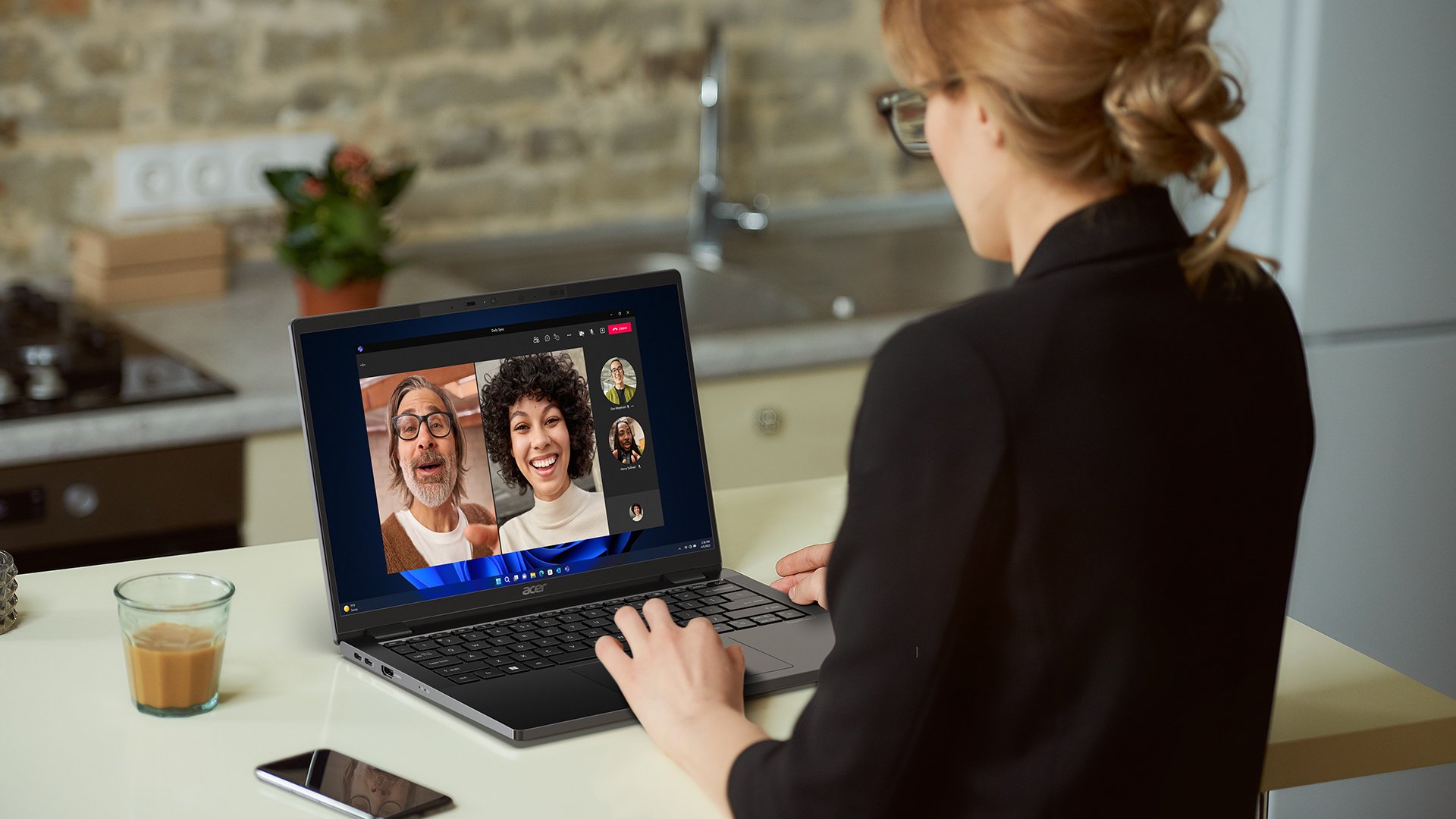
Dell, HP, and Lenovo dominate corporate laptops in North America, with an Apple MacBook or Microsoft Surface Pro occasionally in the mix. However, there are other options, including Acer, which offers a credible alternative through its TravelMate series.
I’ve been using an Acer TravelMate P6 14 (P614-53). It’s not the flashiest machine, but I’ve found it to be very competent with good performance and strong battery life, plus some extras business users might appreciate.
The machine looks like a pretty typical 14-inch notebook, measuring 12.34 by 8.39 by 0.79 inches; the unit I tested was in “Galaxy Black.” It weighs 2.67 pounds (3.27 pounds with the included 65-watt charger), which is lighter than most 14-inch laptops.
It has a terrific selection of ports, with the left side featuring two USB-C/Thunderbolt ports (used for charging) as well as an HDMI 2.1 port for an external monitor; and the right side offering a lock slot, USB-A (USB 3.2), an audio jack, and a microSD card reader. It comes with a USB-C-to-Ethernet dongle, something I haven’t seen on most recent laptops. The only other thing I could ask for is USB-C ports on either side, which would make charging more convenient, but otherwise, it’s very complete.
This unit has an Intel Core i5-1335U (Raptor Lake), a 15-watt processor that has two “performance” cores and eight “efficient cores” for a total of 10 cores and 12 threads, running at 1.3GHz base with a turbo of 4.6GHz. It supports vPro, Intel’s manageability extensions for enterprise users. This isn’t the newer Meteor Lake processor or even the top-end Raptor Lake one, but generally, the machine did everything I asked. My test system came with 16GB of RAM and a 1TB SSD.
In general benchmarks, it scores about as well as other enterprise laptops I’ve tested with Raptor Lake, despite being a Core i5 instead of a Core i7. On my toughest tests, it completed a video transcode in Handbrake in 1:49 hours, on par with the other Raptor Lake systems I’ve tested (although slower than Meteor Lake systems). It ran a MatLab portfolio simulation in 37.5 minutes, and completed a large Excel model in 37 minutes, again on par with most Raptor Lake systems and faster than on the Meteor Lake or AMD Ryzen systems I’ve tried.
Likely because it has a Core i5 instead of a Core i7, performance was slower on graphics tests. On recent AI benchmarks, it was very slow on Procyon’s computer vision AI Inference test (even slower than the other Raptor Lake system I tested with this, which isn’t very good). But it ran a local copy of Stable Diffusion faster than the Lenovo ThinkPad X1 Carbon Gen 12, the only other Raptor Lake system I’ve tried with that test, though unsurprisingly a lot slower than the Dell XPS 14 (9440) I recently tested, which has discrete graphics.
On the other hand, battery life was extremely good—on PCMark 10’s Modern Office test, it lasted 15:34 hours with the screen set to 100 nits, and 18:04 hours with the screen set to 40 nits. This is the best I’ve seen on a machine in this class. Traveling with it, I was able to get through a full day of taking extensive notes to find it still had hours more battery to go.
The display is nothing special, just a non-touch IPS LCD 1,920-by-1,200 display in the now-standard 16:10 ratio. Acer says it has light-sensing technology to automatically adjust the image. Again, it wasn’t special, but it certainly did the job.

(Credit: Acer)
AV is one area that could be improved. It has an FHD (1080p) IR webcam, but I found the images to be softer than I would like, often with artifacts from overhead lighting. For sound, its stereo speakers with DTS audio sounded weaker than many other competitive systems. It’s certainly not the only enterprise laptop with a weak webcam, but I’d like to see something better in today’s work environment.
Recommended by Our Editors
On the other hand, it does have a physical webcam shutter, which many users appreciate, and things like Windows Hello worked well. Acer’s User Sensing application locks the screen when you step away and turns back on when you approach. Again, this worked very nicely.
Acer offers a number of utilities that may be useful for small businesses. These include a “personal secure drive” where you can store files that are encrypted, as well as other options for encrypting files directly from the File Explorer menu, so they can only be decrypted by Windows Hello verification. Other features include a browser guard and application guard, which restrict the use of the applications, again unlocked by Windows Hello; a file shredder; and a USB device filter.
Acer doesn’t sell all the TravelMate brand options through its website, but on CDW as I write this, a model like the one I tested is selling for $1,159, which seems very competitive.
Overall, the TravelMate P6 14 seemed a solid, competent alternative for corporate buyers. I was disappointed in the webcam and sound, but pleasantly surprised by the small utilities and especially the great battery life.
Get Our Best Stories!
Sign up for What’s New Now to get our top stories delivered to your inbox every morning.
This newsletter may contain advertising, deals, or affiliate links. Subscribing to a newsletter indicates your consent to our Terms of Use and Privacy Policy. You may unsubscribe from the newsletters at any time.






